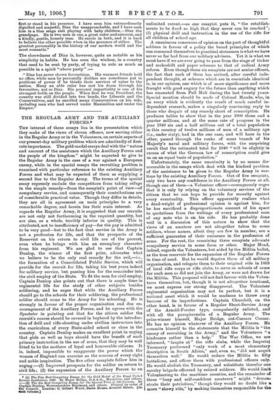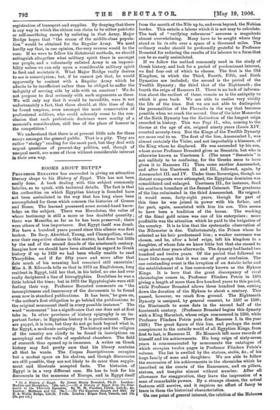THE REGULAR ARMY AND THE AUXILIARY FORCES.*
THE interest of these essays lies in the presentation which they make of the views of eleven officers, now serving either in the Regular Army or in the Volunteers, on certain aspects of our present-day military problem which are admittedly of first- rate importance. The gold-medal essays deal with the "nature and amount of the assistance which the Auxiliary Forces and the people of the kingdom" might be expected to give to the Regular Army in the case of a war against a European enemy, while in the special essays the recruiting problem is examined with particular reference to the existing Auxiliary Forces and what may be expected of them as supplying a second line to the Regular Army. The terms of the special essay expressly exclude the competitors from taking refuge in the simple remedy—from the essayist's point of view—of compulsory service, and consequently their contributions are of considerable practical value. Though they differ in details, they are all in agreement on main principles to a very remarkable degree, and herein lies their main interest. As regards the Regular Army, it is suggested that our recruits are not only not forthcoming in the required quantity, but are also, as a whole, terribly inferior in quality. This is attributed, not to insufficiency of pay—for the pay is admitted to be very good—but to the fact that service in the Army is not a profession for life, and that the prospects of the Reservist on his return to civil life are of the poorest, even when he brings with him an exemplary character from his regiment. We are glad to see that Captain Dunlop, the winner of the first prize, advocates what we believe to be the only real remedy for the evil,—i.e., the formation of a Consolidated Public Service, which will provide for the recruit for life, taking his best years indeed for military service, but passing him for the remainder into the civil employ of the State. To fit the men for civil employ, Captain Dunlop also points out, that there is ample time in regimental life for the study of other subjects besides soldiering, and he urges that while the Auxiliary Forces should go to the schools for their soldiering, the professional soldier should come to the Army for his schooling. He is strongly in favour of the proper organisation and due en- couragement of the Auxiliary Forces, and he agrees with the Spectator in pointing out that for the citizen soldier the recruit's course should be covered in boyhood by the introduc- tion of drill and rifle-shooting under civilian instructors into the curriculum of every State-aided school or class in the country. Captain Dunlop makes an excellent point in urging that girls as well as boys should have the benefit of such primary instruction in the use of arms, that they may be well fitted to be the mothers of loyal and honourable citizens. It is, indeed, impossible to exaggerate the power which the women of England can exercise as the sources of every right and noble inspiration. The five other essayists follow him in urging ;—(I) Improved prospects for the soldier on return to civil life ; (2) the expansion of the Auxiliary Forces to an • (1) The Five Best Competing Essays for the Gold Medal of the Royal United Service Institution, 1906. By Major Bridge, D.A.A.G., Mauritius, and others. —(2) The Six Beat Competing Essays for the Special Prize of 100 Guineas. By Captain Dunlop, Worcestershire Regiments and others. Printed by order of the Council. London: C. Gilbert Wood, Deere House. Arundel Street. [ls. OM% volume.] unlimited extent,—as one essayist. puts it, " the establish- ments to be fixed so high that they never can be reached "; (3) physical drill and instruction in the use of the rifle for all children of school age.
A unanimous consensus of opinion on the part of thoughtful soldiers in favour of a policy the broad principles of which can commend themselves to practical statesmen is what we have never so far had from our military advisers. Yet it is whatwe must have if we are ever going to pass from the stage of tinker and makeshift and paper schemes to that of radical Army reform Even though these six essayists are not senior officers, the fact that each of them has arrived, after careful inde- pendent thought, at schemes which are in essentials identical is, in our opinion, one which is of more significance and more fraught with good augury for the future than anything which has emanated from Pall Mall during the last twenty years. Special mention should be made of Colonel Maude, who, in an essay which is evidently the result of much careful in- dependent research, makes a singularly convincing reply to those who despair of any remedy short of conscription. He produces tables to show that in the year 1900 three and a quarter millions, and at the same rate of progress in the year 1940 six and a half millions out of a total population in this country of twelve millions of men of a military age (i.e., under sixty), had in the one case, and will have in the other, passed through the ranks of some branch of his Majesty's naval and military forces, with the surprising result that the estimated total for 1940 "will be slightly in excess of what the German law of conscription could give us on an equal basis of population."
Unfortunately, the same unanimity is by no means dis- coverable in the essays which deal with the kindred problem of the assistance to be given to the Regular Army in war- time by the existing Auxiliary Forces. Out of five essayists, only two have any confidence in the Auxiliary Forces at all, though one of them—a Volunteer officer—courageously urges that it is only by relying on the voluntary services of the citizen that we can hope to provide for security against every eventuality. This officer apparently realises what a dead-weight of professional opinion is against him, for he has sacrificed a disproportionate amount of his space to quotations from the writings of every professional man of any note who is on his side. He has probably done well in a discussion of this nature to show that the views of an amateur are not altogether taboo to some soldiers, whose names, albeit they are few in number, are a sufficient guarantee of their eminence in the profession of arms. For the rest, the remaining three essayists advocate compulsory service in some form or other. Major Mead, indeed, regards the Volunteers, but aided by the Militia ballot, as the true reservoir for the expansion of the Regular Forces in time of need. But he would deprive them of all military organisation, and relegate them to their original role in 1859 of local rifle corps or rifle clubs, to serve as schools of arms for such men as did not join the Army, or were not drawn for the Militia. This proposal will not find favour with the Volun- teers themselves, but, though it is not altogether irrational, we must express our strong disapproval. The Volunteer regimental organisation may not be perfect, but it is a national asset which it would be madness to throw away because of its imperfections. Captain Churchill, on the other hand, is in favour of a Regular Short-Service Army of the Arnold-Forster type, compulsorily enlisted, and with all the paraphernalia of a Regular Army. The prize-winner himself, Major Bridge, out-Caesars Caesar. He has no opinion whatever of the Auxiliary Forces. He commits himself to the statements that the Militia is "the enemy of recruiting in the Army," and the Volunteers "a hindrance rather than a help." The War Office, we are informed, "laughs at" the rifle clubs, while the Imperial Yeomanry performed "only work of a most elementary description in South Africa," and, even so, " did not acquit themselves well." He would reduce the Militia to fifty battalions, and officer them with professional officers only. He would abolish the Yeomanry, and substitute therefor one cavalry brigade officered by retired soldiers. He would limit Volunteering to the maritime counties, and the remainder of these " busy and self-confident amateurs " might " demon- strate their patriotism," though they would no doubt like a more " showy role," by making themselves responsible for the
registration of transport and supplies. By denying that there is any way in which the citizen can claim to be either patriotic or self-sacrificing except by enlisting in that Army, Major Bridge hopes that "the cream of the middle-class popula- tion" would be obtained for the Regular Army. We need hardly say that, in our opinion, the veryreverse would be the case. If we were to follow his dictatorial methods, we should extinguish altogether what military spirit there is amongst our people, and a voluntarily enlisted Army is an impossi- bility unless we can rely upon a considerable military spirit to feed and maintain it. What Major Bridge really desires to see is conscription; but, if he cannot get that, he would apparently be content with a Regular Army which he admits to be insufficient rather than be obliged to suffer the indignity of serving side by side with an amateur ! We do not propose to deal seriously with such arguments as these. We will only say that it would be incredible, were it not unfortunately a fact, that there should, at this time of day, be found umpires, even amongst the most conservative of professional soldiers, who could solemnly come to the con- clusion that such prehistoric doctrines were worthy of a moment's consideration, still less of the place of honour in the competition !
We understand that there is at present little sale for these essays amongst the general public. That is a pity. They are rather "stodgy" reading for the most part, but they deal with urgent questions of present-day politics, and, though of unequal merit, are none of them without considerable interest in their own way.











































 Previous page
Previous page